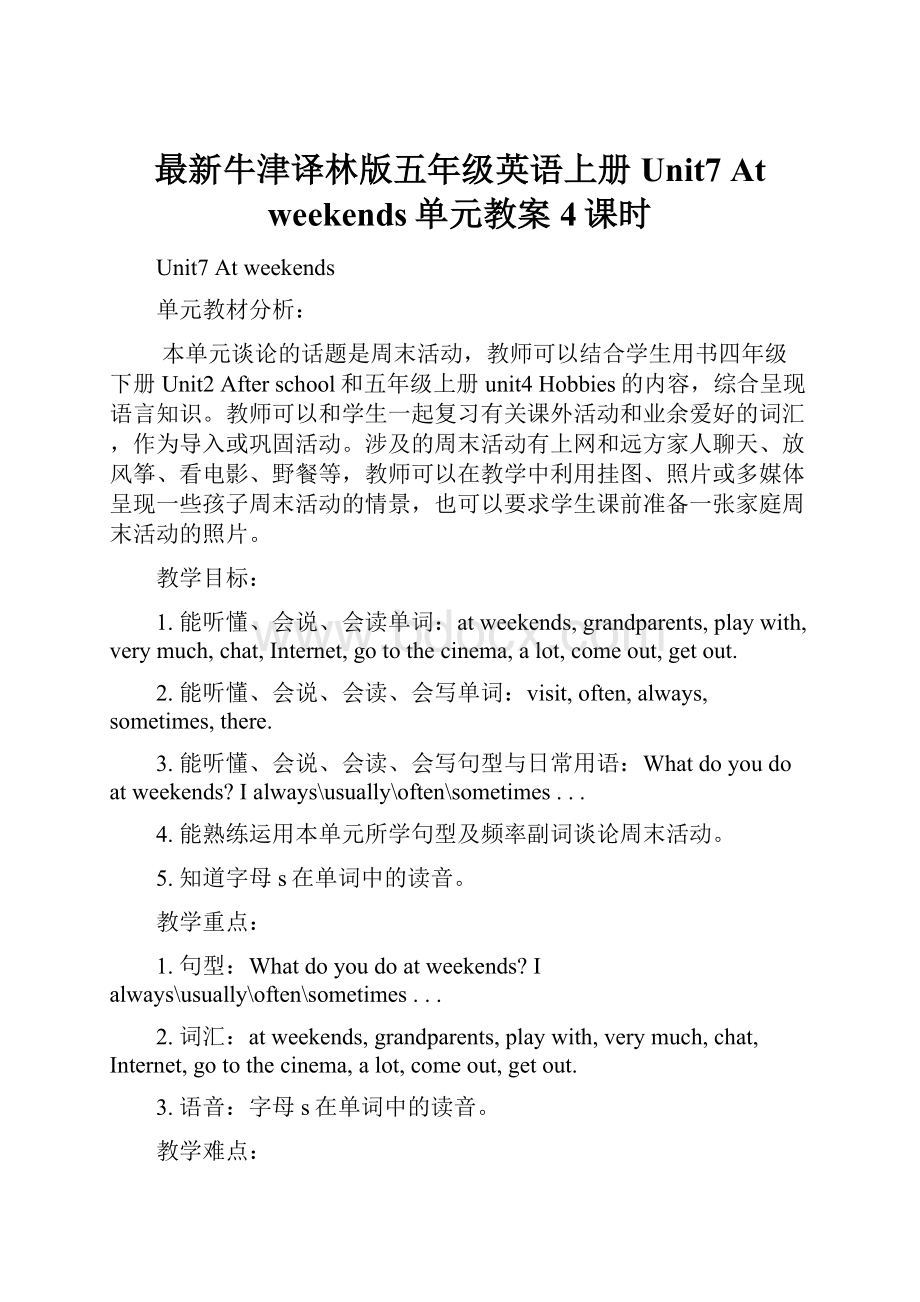最新牛津译林版五年级英语上册Unit7 At weekends单元教案4课时.docx
《最新牛津译林版五年级英语上册Unit7 At weekends单元教案4课时.docx》由会员分享,可在线阅读,更多相关《最新牛津译林版五年级英语上册Unit7 At weekends单元教案4课时.docx(12页珍藏版)》请在冰豆网上搜索。

最新牛津译林版五年级英语上册Unit7Atweekends单元教案4课时
Unit7Atweekends
单元教材分析:
本单元谈论的话题是周末活动,教师可以结合学生用书四年级下册Unit2Afterschool和五年级上册unit4Hobbies的内容,综合呈现语言知识。
教师可以和学生一起复习有关课外活动和业余爱好的词汇,作为导入或巩固活动。
涉及的周末活动有上网和远方家人聊天、放风筝、看电影、野餐等,教师可以在教学中利用挂图、照片或多媒体呈现一些孩子周末活动的情景,也可以要求学生课前准备一张家庭周末活动的照片。
教学目标:
1.能听懂、会说、会读单词:
atweekends,grandparents,playwith,verymuch,chat,Internet,gotothecinema,alot,comeout,getout.
2.能听懂、会说、会读、会写单词:
visit,often,always,sometimes,there.
3.能听懂、会说、会读、会写句型与日常用语:
Whatdoyoudoatweekends?
Ialways\usually\often\sometimes...
4.能熟练运用本单元所学句型及频率副词谈论周末活动。
5.知道字母s在单词中的读音。
教学重点:
1.句型:
Whatdoyoudoatweekends?
Ialways\usually\often\sometimes...
2.词汇:
atweekends,grandparents,playwith,verymuch,chat,Internet,gotothecinema,alot,comeout,getout.
3.语音:
字母s在单词中的读音。
教学难点:
1.句型:
Whatdoyoudoatweekends?
Ialways\usually\often\sometimes...的使用。
2.词汇:
always,usually,often和sometimes频率副词的区别及正确用法。
3.语音:
字母s在单词中的读音。
课时安排:
第1课时:
Storytime(text,Lookandwrite)
第2课时:
Grammartimeandfuntime
第3课时:
Cartoontime,Culturetime
第4课时:
Checkouttime,Soundtime
第一课时
Step1.Lead-in
1.PPT出示学生学过的体育运动类、兴趣爱好类、日常活动类词汇,齐读。
T:
Lookatthesephrasesandwords,youcanaskyourpartneraquestion.Forexample:
Whatdoyoulike?
Whendoyougetup?
...
Workinpairs.
2.T:
Boysandgirls,whendoyougotoschoolinthemorning?
S:
...
T:
WealwaysgotoschoolfromMondaytoFriday.
3.PPT出九月份的日历
生齐读一周七天的单词
T:
WealwaysgotoschoolfromMondaytoFriday.ButWedon’tgotoschoolonSundayandSaturday.
PPT:
onSundayandSaturday=atweekends
教读“atweekends”
Step2.Presentationandpractice
1.T:
Atweekendsyoudon’tgotoschool.Whatdoyoudoatweekends?
S:
Iusually...
Workinpairs.
T:
AtweekendsIalwaysvisitmyparents,sometimesIchatwithmyfriendontheInternet.
教读此句。
2.T:
(PPT出示书中人物)Whatdotheydoatweekends?
Readandmatch
PPT:
visitgrandparents
playfootball
Mikeflyakite
gotothecinema
HelenchatwithgrandparentsontheInternet
playwithKittythecat
SH&SYhaveapicnic
haveadancinglesson
havedinnerwithgrandparents
3.学生自读课文并在文中画出关键词。
4.汇报
T:
WhatdoesMikedoattheweekends?
S:
...
T:
WhatdoesMikedoattheweekends?
S:
...
T:
WhatdoSuHaiandSuYangdoattheweekends?
S:
...
5.再读课文,深入理解课文
师引导学生将人物的周末活动按照发生频率进行归类,然后引导学生用频率副词介绍四人的周末活动:
6.跟录音读课文。
7.Lookandwrite
规则:
同桌一个以书中人物自述,另一个以第三人称进行转述,以便进一步操练一般现在时第三人称单词形式。
Step3.Consolidation
1.复述课文
引导学生复述书中四个人物的周末活动,提示学生正确使用动词的第三人称单数形式。
然后让学生将自己复述的人物活动写下来,加强写的练习。
2.Ask,Chooseandsay
以小组为单位,完成此调查表。
Step4.Homework
1.Read“storytime”afterthetape.
2.试着介绍家人的周末活动。
板书设计:
Unit7Atweekends
Whatdoyoudoatweekends?
Ialways\usually\often\sometimes...
教学反思:
第二课时
教学目标:
1.了解助动词do和does区别
2.词汇always,usually,often,sometimes频率副词的区分和正确用法。
3.句型Whatdoyoudoatweekends?
Ialways/usually/often/sometimes…
Whatdoeshe/shedoatweekends?
He/she…
Whatdotheydoatweekends?
They…的使用
教学难点:
句型Whatdoyoudoatweekends?
Ialways/usually/often/sometimes…
Whatdoeshe/shedoatweekends?
He/she…
Whatdotheydoatweekends?
They…的使用
教学过程:
一,复习。
1.词汇
2.课文对话
二,操练
Whataboutyou?
Whatdoyoudoatweekends?
Whatdoeshe/shedoatweekends?
导入,操练句型
A:
Whatdoyoudoatweekends?
B:
I…
A:
Whatdoeshe/shedoatweekends?
B:
He/She…(s)…
三,呈现并巩固
由He….Shealso…导入they…
呈现问句What______youdoatweekends?
What______theydoatweekends?
What_______hedoatweekends?
What_______shedoatweekends?
让学生先通过前面的课文的学习和对话的语言交流中初步感知句型,让学生完成填空,并通过读的形式总结do,does的区别,老师进行补充。
再通过练习的形式进行巩固。
达到学以致用的目的。
由HowcanIanswer导入答句。
Ioften_________dinnerwithmygrandparents.
Theyusually_________akiteand_______apicnic.
Shealways_________dancinglessons.
Hesometimes_________tothepark.方法同上。
(设计思路,做练习虽然枯燥,但语法项目要掌握,一定要通过适时的练习进行巩固,课堂的目的是有效,问题要在课堂中解决。
)
再以星的形式让学生识别频率副词及正确用法。
四,游戏
以竞赛的形式让学生对话,并以组为整体,看哪个组最先完成句型问答的加一个星,最后看哪个组星最多,哪个组获胜。
(一方面提供了学生运用所学句型的平台,一方面增加了学生们的积极性和游戏的趣味性)
五.拓展
以小记者采访的形式进一步巩固所学句型。
(增加生活性,趣味性,学生有话说)
并完成表格,让学生根据表格叙述采访到的学生。
…
…’sfather
…’smother
…’s…
提示句型:
Whatdoyoudoatweekends?
Whatdoesyourfatherdoatweekends?
Whatdoesyourmotherdoatweekends?
Whatdoes….doatweekends/
五、情感教育
Iknowmanystudents’sfamily.Whatdotheydoatweekends?
Allofusareallinabigfamily.WeareinClass2Grade5.AreyouhappyinClass2Grade5?
Ihopeallofushaveahappyfamily.
六、家庭作业
用所学句型了解你的朋友周末所做的事情。
板书设计:
Unit7Atweekends
Whatdo...doatweekends?
I/We/They....
Whatdoes...doatweekends?
........s.....
教学反思:
第三课时
教学目标:
1、能正确理解、朗读Cartoontime中的故事,能读懂其中的趣味之处,能在教师的指导下表演故事。
2、了解英美人和中国人喜爱的体育运动。
教学重点:
1.读懂读通cartoontime内容并能表演出来
2.口语表达时注意语气与语意的相符性
教学难点:
表演时的神态及表现出来的趣味性
教学准备:
多媒体
【教学学过程】
Step1:
Warm-upandrevision.
1.Playaguessinggame.(doandguess)
Askandanswer:
Whatdoyou/theydoatweekends?
Whatdoesshe/hedoatweekends?
2.Practice:
Lookatthepictures,askandanswer.
Step2:
Lookandsay.(Cartoontime)
1.Lookatthepictureandask:
WhereisBilly?
Whatdoeshelikedoing?
2.Watchandanswer:
WhatdoesBillyalwaysdoatweekends?
3.Readandjudge:
①.Billydoesn’tlikeswimming.
②.Billyoftenplaysbasketballwithhisfriends.
③.Billywantstohaveapicnic.
4.Talkabout‘comeout’and’getout’.
5.Listenandrepeat.
6.Readtogether.
7.Readinroles.
8.Actoutthedialogue.
Step3:
Lookandmatch(Culturetime)
1.Showsomepicturesoffamoussportsstars.
Whoishe/she?
Whereisshe/hefrom?
Whatsportsdotheylike?
2.Matchandread
isverypopularin.
3.Let’sshare:
enjoysomepicturesofsports.
Step4.Homework
1.Listen,readandactCartoontime.
2.LookforthenamesandpicturesofthefamoussportsstarsontheInternet.
【板书设计】
Unit1Atweekends
Whatdoyou/theydoatweekends?
comeout
Whatdoesshe/hedoatweekends?
getout
教学反思:
第四课时
教学目标:
1.能听懂、会说、会读、会写句型与日常用语:
Whatdoyoudoatweekends?
Ialways\usually\often\sometimes...
2.能运用所学句型及单词介绍自己及家人的周末活动。
3.了解国内及国外人们喜爱的体育运动。
4.了解字母s在单词中的读音
教学重难点:
能运用所学句型及单词介绍自己及家人的周末活动。
教学准备:
多媒体
Stop1.FreetalkandLeadin
Stop2.Culturetime
1.T:
TabletennisisverypopularinChina.
PPT出示此部分内容
2.生跟录音读。
PPT:
A.美国人喜爱的运动
B.足球运动在英国
3.PPT出示其他一些国家的运动,如韩国人比较喜欢击剑,印度人比较擅长长跑等,让学生多了解一些。
Stop3.Tickingtime
1.Icantalkaboutweekendactivities
T:
Nowyoutalkaboutyourfamilyweekendswithyourpartner,OK?
2)学生同桌讨论。
3)指名汇报。
4)让学生将自己讨论的内容写下来。
2.Icanuse“always”,“usually”,“often”and“sometimes”.
1)T:
IalwaysgotoworkfromMondaytoFriday.Intheevening,IusuallywatchTV.AtweekendsIoftendohousework,sometimesIgoshopping.Howaboutyou?
T:
Canyouintroduceyourselflikethis?
学生练说,然后指名说。
2)生将自己说的内容写下来。
3.Iknowthesoundoftheletter“s”。
判断下列各组单词划线部分的发音是否相同,相同的写“T”,不同的写“F”.
booksbagsalways
()1.()2.()3.
grapeshasus
pearsrosecakes
()4.()5.()6.
hismusicsee
Stop3.Soundtime
1.T:
Attheweekends,BillyalwayseatandwatchTV.Lookatthechildren,whatdotheydoattheweekends.
PPT出示P73,通过问答,引出含有目标因素读/z/的单词。
T:
Who’stheoldmaninthepicture?
S:
He’sMrRose.
T:
Whatdoeshealwaysgrowinhisgarden?
S:
Healwaysgrowsroses.
2.教师示范读单词,学生跟读。
3.播放录音,并带领学生跟读绕口令,鼓励学生一起有节奏地打拍子。
4.PPT出示一些含有字母s的单词,包括音素读/z/和/s/,让学生区分,如six,seven,sister,sorry,this,is,always,music,tennis等。
Step4.Exercise(补充习题P32、33)
1.Lookandsay.
2.Readandwrite.
Step5.Homework
1.上网查找其他一些国家人们喜欢的运动。
2.做《练习与测试》上的本单元测试。
板书设计:
UnitAtweekends
S:
/S/
/Z/
教学反思: